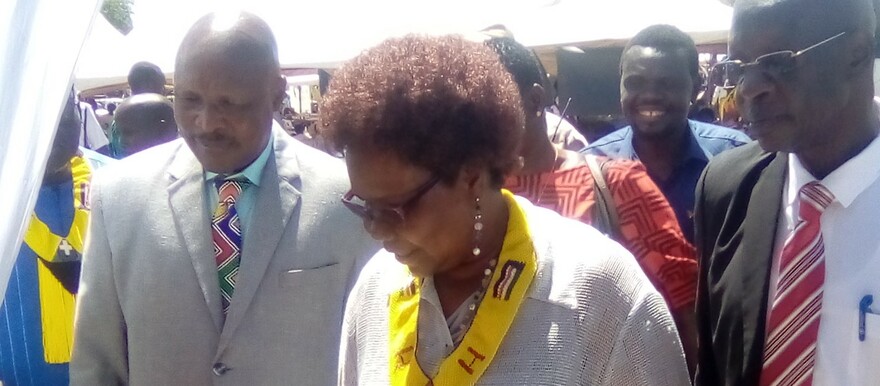South Sudan’s Minister of Agriculture, Josephine Lagu, emphasized the potential of Eastern Equatoria State and South Sudan to become a significant food producer for the entire East African region. She highlighted the nation’s current reliance on neighbouring countries for food.
Minister Lagu made these remarks during the World Food Day and Agriculture Show, which was organized by the Ministry of Agriculture in collaboration with various line ministries and development partners on Tuesday. The event’s theme was “Water is Life, Water is Food, Leave No One Behind.”
Eastern Equatoria State was chosen to host the World Food Day event on behalf of the ten states of South Sudan. This selection aimed to provide a platform for sharing innovations, technologies, and establishing market linkages for the future.
It’s worth noting that last year, the World Food Day was celebrated in Rumbek, following a rotational annual commemoration format that started in Malakal.
Josephine Lagu, South Sudan’s Minister of Agriculture, emphasized the agricultural potential of the region, stating, “In this state, people can produce food. We have seen all sorts of crops. We have seen maize, we have seen sorghum. We have seen vegetables and we have seen fruits. We have seen fish of all types. So we have seen that indeed in this state like in other states in our country, we can produce food, sufficient food to feed ourselves.”
She further underlined the need for additional support, explaining, “But we can do more we can do more. Just imagine with what we have seen here, supposing we add a little bit of micro-financing for our people; Suppose we pave the roads and make sure that we have feeder roads to bring produce from production areas to the market. Suppose we add marketing skills and strategies, suppose we add transportation, and suppose we add value addition to all these crops that we are growing here.”
In the context of addressing local food security issues and South Sudan’s potential to become a food supplier for the Eastern and Horn of Africa region, Agriculture Minister Josephine added, “There will be no hunger in this country, and we can actually produce enough food not just to feed ourselves. We also create jobs for our people, especially our young people and women. We can produce enough food to feed the entire region.”
Eastern Equatoria State Governor Louis Lobong Lojore highlighted the region’s agricultural suitability, stating, “Our land is very suitable for any type of crops, and you can see the crops there because any seeds you plant on it will definitely produce a good harvest, especially if you’re mindful of using their valuable running water efficiently. Any fishermen who throw a net or a basket in any water sources in this country will definitely catch fish, and any beehive placed anywhere will definitely harvest honey.”
Governor Lobong also noted the tendency for exaggerated claims regarding South Sudan’s agriculture potential, saying, “Some people have exaggerated the agriculture potential across South Sudan when they have said, ‘Even if you plant a nail, it will germinate.’ South Sudanese must conserve water and land to produce a variety of healthy foods.”
He emphasized the importance of utilizing the region’s physical features for sustainable food security and exporting surplus agricultural products.
Onyoti Adigo, South Sudan’s National Minister for Livestock, emphasized the need for unity and development among South Sudanese. He stated, “We have a lot of resources, land, goats, cattle, but we have challenges like no food, no water. Why can’t we bring water from the Nile like that of Gezira in Sudan? We can also make that happen in South Sudan. The most important thing is peace; there are a lot of things in Eastern Equatoria State, and we need to be at peace so that we can develop.”
Minister Onyoti also discussed the need for clear laws to guide farmers and pastoralist activities, aiming to prevent conflicts. He added, “I know your problems caused by pastoralists who came from other states, but in case someone has animals here and is from another state, they should follow the laws here, but not create contrary laws.”
Pastor Romano Oguma, representing the farmers in Eastern Equatoria State, expressed their determination to contribute to South Sudan’s food production despite numerous challenges. He stated, “We are facing farming plagued by natural disasters such as drought, delayed rain, climate change, and the process of recovering from conflict.”
Pastor Oguma highlighted the resilience of local farmers, stating that there was a visible sense of hope in their production. He mentioned that the veteran farmers had endured challenging situations and, despite this, had achieved good yields.
He added that numerous farmers in their community received assistance from partners. Additionally, some of those who transported their produce to the area were also backed by these partners due to their limitations in continuing to transport their goods for various reasons.
Looking ahead, he shared his hopes for the future, particularly addressing the road network challenges in productive areas. He noted, “Although we face problems, one of them is the road network, especially in productive areas. It is difficult to transport food from places like Chukudum, Lobone, Iyire, even though these areas are highly productive.”




